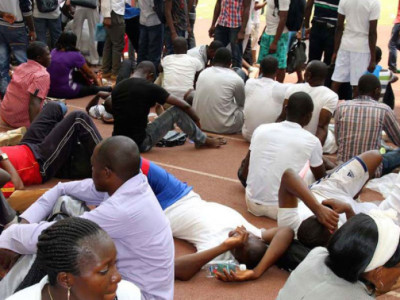
It’s Easter and that’s something to cheer us. To boot, the Senate has given us a rare Easter gift by passing the budget on Wednesday, after three months into the year.
The debate over the years has been how we can hit the New Year as a country and start the implementation of our budget rather than wasting valuable time discussing what is wrong with the budget.
Of course, I had thought that the new government will achieve that since the ruling party has more people at the National Assembly, but I was dead wrong.
The elementary issue of missing budget and the secondary issue of budget padding kept everything in indeterminate state until three days ago.
But since the budget for 2016 is now ready for implementation and the National Bureau of Statistics data for the last quarter is nothing to smile about, there’s already something for the government to look back into, before it springs forward the way they do the American time during spring season.
From the NBS figure, we certainly need a desperate solution, but it will be important to understand why unemployment is growing in the country and why corruption proliferates.
Let’s look at the statistics: Nigeria’s working population grew from 104.3 million in Q3 2015 to 105.02 million in Q4 2015, with 28.1 million economically active persons unwilling to work.
According to the NBS, “the labour force population (i.e those within the working 09age population willing, able and actively looking for work) increased to 76.96 million from 75.94million in Q3 2015.
“During the same period, the number of unemployed in the labour force, increased by 518,102 persons, resulting in an increase in the national unemployment rate to 10.4% in Q4 2015 from 9.9% in Q3 2015 and from 8.2% in Q2 2015”.
We’ve all crunched the figure. With 1,454,620 in unemployment cadre from July 1 to September 30, 2015, and 518,102 from October to December 2015; no fewer than 1,972,722 citizens were unemployed in the first six months of this administration. That’s if NBS data actually captured all the people, which I doubt.
If we do not go by graph only and actually undertake the census, head to head, the figure will balloon. We will then have more than the NBS figure of total figure of unemployment and underemployment during the current cycle.
Income inequality and social economic deprivation are the issues that continue to show up in the figure, if we care to look beyond the surface.
These two—income inequality and social deprivation— are the elephants that the government must deal with, while ensuring that the kind of jobs that are provided are able to lift people out of poverty and breed wealth.
As inequality mounts and the policies entrenching it remain, there’s going to be a continued bleak future for the country.
Corruption and crime will not die out of our life as a people, because one of the main drivers of corruption and crime is inequality.
I always cite the examples of bad policies from state governments that have underdeveloped our young people.
When young, skillful, just-out-of-school graduates are employed to serve in areas different from their orientation, we’re doing more damage to the future.
The sad side of the story comes from those states that engage skillful graduates as cleaners or traffic controllers and pay them pittance. The income inequality will grow and as it grows, the people concerned will determine their future within the system.
The common phrase on our streets these days known as “we’re surviving,” comes from that reality.
Conversely, one man whose income is proportionally higher will reach out to the extremely low-income individual for a “deal” in the same department, whether private or public.
The “deal” of course will perhaps change the fortune of the low-income individual albeit in illegal way, but in his/her mind he’s surviving.
And that’s the phrase you hear everywhere across the country. “We’re surviving!”
Yes, with illegal deals going on everywhere, some individuals may be surviving; the country will eventually cave in. That’s what we have seen in many of the high profile corruption cases currently under trial.
There will always be those abetting corruption and crime and they often come from the group experiencing income inequality.
So before the government creates its much touted one million jobs for 2016, there’s need to pause.
According to the Vice President Yemi Osinbajo, the government will create job opportunities for 500,000 graduate youths, to be engaged as teachers and another estimated 500,000 non-graduate unemployed people to be trained as artisans. Will these jobs leapfrog our economy? Will the jobs check income inequality?
These are the two questions the government needs to answer before it continues.
Already, there have been issues around engaging people to teach just to create jobs without looking at the impact on our sinking educational system. That is another meat.
Now, we hope those jobs for the graduates have not been created in government agencies using the Central Bank method of targeted recruitment that has now left the reputation of the leadership of the CBN in shambles with the CBN’s spokesperson, Isaac Okoroafor, struggling to do scam management kind of public relations in recent weeks.
There’s need to pause and think about income inequality and its side effects.
We cannot ignore the main issue for too long that wealth distribution in the country is something we need to address with urgency.
Inequality is just one factor that could compromise Nigeria’s prospects for sustainable development, even with all the reforms.
In 2013, the Economist Intelligence Unit rated Nigeria the worst place to start life out of 80 countries surveyed. The statistics has not changed.
THISDAY
END

Be the first to comment